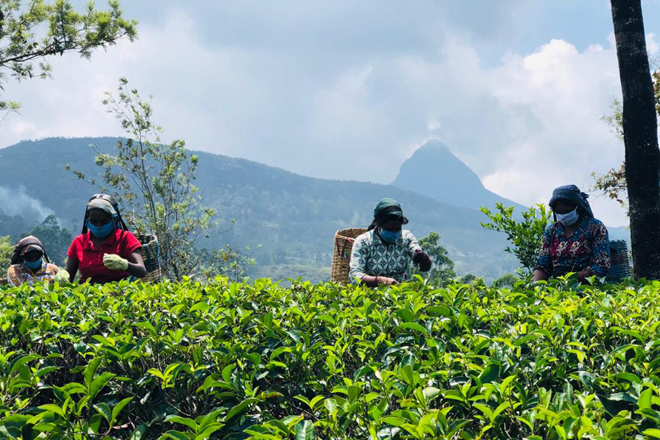Fitch Ratings has upgraded Sri Lanka-based Kotagala Plantations PLC's National Long-Term Rating to 'B+(lka)', from 'RD(lka)'. The Outlook is Negative. Fitch has simultaneously upgraded the National Long-Term Rating of Kotagala's outstanding senior unsecured debentures to 'B+(lka)', from 'C(lka)'.
The upgrade reflects the completion of Kotagala's debt restructuring process in May 2023.
The Negative Outlook considers the company's weak liquidity given its untested post-restructuring bank access and Fitch's expectation that Kotagala's internal funding sources will be insufficient to meet its obligations in the financial year ending March 2024 (FY24).
KEY RATING DRIVERS
Loan Restructuring Completed: Kotagala restructured its bank loans by obtaining waivers for accrued and past-due interest and receiving maturity extensions. The company restructured its outstanding LKR500 million debentures in September 2020 and around LKR1.2 billion of its bank loans by extending the maturity and reducing interest costs.
In return, some lenders required timely settlement using tripartite agreements that directed revenue of certain estates directly for debt servicing. The company said it is now up to date on all restructured obligations.
Untested Funding Access, Weak Liquidity: Kotagala is in discussions with banks for new credit facilities following the completion of its debt restructuring, but its ability to meaningfully access external funding remains untested. We project negative free cash flow (FCF) of around LKR110 million in FY24 after the payment of LKR390 million in
past-due statutory obligations and annual replanting capex of LKR109 million. Kotagala will face close to LKR700 million in near-term debt maturities in the next 12 months and it will need access to external financing to meet its obligations.
Past-Due Statutory Arrears: Kotagala had LKR1.1 billion due on employee pensions, gratuity provisions and government leases at FYE23. Kotagala has partly settled past-due lease rent on its plantation estates owed to the government and intends to settle the remaining LKR75 million during FY24.
It expects this to be followed by government approval to harvest and sell timber from these estates. The sale of timber trees is likely to generate about LKR100 million-150 million per annum in additional revenue, although there could be material execution risks and delays.
Pressure on EBITDA Margin: We expect Kotagala's EBITDA margin to contract to 16% in FY24 from 25% in FY23. Domestic tea and rubber auction prices were favourable in 2022, supported by supply shortages and a depreciating local currency as prices are quoted in US dollars.
However, we expect gradually normalising supply, weak demand and a modest appreciation in the local exchange rate to exert pressure on prices, weakening profitability in FY24. Higher production yields amid the availability of fertilisers and fuel may limit the negative impact to an extent.
Parent's Low Incentive to Support: Fitch rates Kotagala on a standalone basis as its stronger ultimate parent, The Colombo Fort Land and Building PLC (CFLB), has limited incentive to provide support, according to our Parent and Subsidiary Linkage Rating Criteria.
We assess CFLB's legal, strategic and operational incentives to extend support as 'Weak'. The 'Weak' legal incentive stems from the absence of corporate guarantees from CFLB on Kotagala's debt, and the lack of cross-default clauses linking the parent's debt to that of Kotagala.
Kotagala's contribution to CFLB's group EBITDA will remain below 15% over FY24- FY26 while factors such as competitive advantages to the parent and CFLB's growth potential remain low, weakening the overall strategic support incentive.
CFLB has provided limited support in the past via working-capital funding, but this has not been sufficient to avoid a default. Operational incentives to support are also weak as CFLB is diversified, with limited operational synergies with Kotagala, with no brand overlap and little common management.
DERIVATION SUMMARY
Kotagala's rating reflects weak liquidity and high credit risk stemming from its limited access to funding sources, volatile operating cash flow and limited medium-term business prospects due to inherent weaknesses in its tea and rubber plantation businesses. These factors result in Kotagala being rated multiple notches below other publicly rated non-financial corporates in Sri Lanka.
KEY ASSUMPTIONS
Fitch's Key Assumptions Within Our Rating Case for the Issuer:
- Revenue to decline by 13% in FY24 amid moderating crop prices but improving yields
will provide support to a certain extent. - EBITDA margin to decline to 16% in FY24 amid moderating crop prices.
- Capex of around LKR109 million in FY24 mainly on replanting.
- No dividend payments over FY24-FY25.
RATING SENSITIVITIES
Factors that could, individually or collectively, lead to positive rating
action/upgrade: - Not meeting the negative sensitivities over an extended period could lead to the Outlook
being revised to Stable
Factors that could, individually or collectively, lead to negative rating
action/downgrade: - Further weakening in liquidity, including challenges in accessing new credit lines or
other funding sources
LIQUIDITY AND DEBT STRUCTURE
High Liquidity Risk: As of end-March 2023, Kotagala had LKR180 million in cash and no unutilised credit facilities compared with LKR682 million in debt maturing in the next 12 months. This includes LKR312 million in broker credit, which we expect will be rolled over in the normal course of business because it is backed by revenue from the sale of tea.
Kotagala's contractual maturities of term loans in the next 12 months amount to around LKR285 million, out of which LKR85 million will be paid directly through the tripartite agreements with tea brokers.
In the absence of fresh credit facilities or other external funding sources, the company's cash on hand will be insufficient to cover the company's
obligations and the Fitch-projected negative FCF in FY24.
ISSUER PROFILE
Kotagala is a domestic plantation company engaged in the cultivation and sale of tea, rubber and palm oil.
REFERENCES FOR SUBSTANTIALLY MATERIAL SOURCE CITED AS KEY
DRIVER OF RATING
The principal sources of information used in the analysis are described in the Applicable Criteria.

